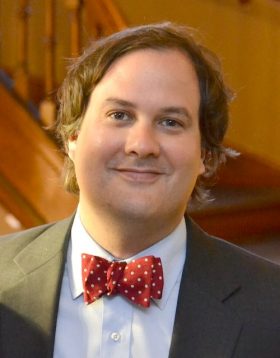Elon Law Professor Enrique Armijo explained on WFDD radio why North Carolina’s new Property Protection Act, allowing companies to sue whistleblowers who conduct undercover investigations, is likely to be struck down in federal court.

Listen to Elon Law Professor Enrique Armijo’s interview with Keri Brown on WFDD radio here.
“The reason (these laws) are called ag-gag laws is because legislatures began to pass these based on lobbying from companies in the agricultural food industry after several animal rights groups made under cover videos in slaughter houses and other places and gave them to the news media,” Armijo said in a WFDD radio interview.
The new law states that employees are liable for civil damages resulting from when an employee “creates or produces an image or sound occurring within an employer’s premises and uses the recording to breach the person’s duty of loyalty to the employer” or places “on the employer’s premises an unattended camera or electronic surveillance device and us(es) that device to record images or data.”
Armijo said the impulse to protect privacy was understandable, but that the law’s scope raises concerns.
“It’s more than fair to be concerned about privacy,” Armijo said. “Anybody that has a cell phone now has the ability to make one of these videos and distribute it to anyone they want … but I think we run a real risk when we close the doors and turn off the lights of these industries such as agriculture, the nursing home industry and these industries that offer a public service.”
Asked on WFDD whether he thought the law would survive a federal lawsuit challenging the new state law, Armijo said no.
“I think it’s pretty clear that this law violates the First Amendment,” Armijo said. “It’s aimed at a certain kind of content, and what that means when a law is content based is that the court reviewing this statute … is going to apply the highest level of Constitutional scrutiny in this case. And based on that and the fact that the reviewing court is going to be very skeptical of the law because it is aimed at a certain kind of speech, I think the law has little chance of survival. In fact that’s what an Idaho district court held in August when it threw out a similar statute that was passed in that state.”
Listen to Elon Law Professor Enrique Armijo’s interview with Keri Brown on WFDD radio here.
More information about Elon Law Professor Enrique Armijo is available here.


